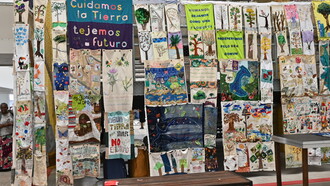The World Social Forum in Mexico City and the World Economic Forum in Davos both ended without conclusions. It is their normal way of working since they want to be nothing more than ‘open spaces’ where people meet, talk and listen.
There are many differences between them of course. However, in this article, I want to focus on one other common characteristic, approached from two very different logics.
When talking of two major global problems of today, poverty and inequality, both the World Social Forum and the World Economic Forum prefer to focus on their multi-dimensionality; that is they prefer to not speak of incomes and wealth.
For social movements, it is a kind of rejection of modern and materialistic thinking. Poverty, in their eyes, is mainly a problem of housing, lack of health, lack of a job, each time with psychological consequences. That is why poor people need help. Poverty, so they think, cannot be solved with money alone, it needs care and support. Poverty is a consequence of the hard, cold world we are living in. We should care for poor people with warm, direct solidarity, with love. Yes, poor people need money, but that is not the most important thing.
For the global elites who put poverty reduction on their agenda some thirty years ago, this non-materialistic thinking is extremely useful. "Poor people rarely speak about money," said the World Bank in its interpretation of poor people’s stories about low wages and low market prices. The World Bank only sees a lack of skills and badly functioning markets. Take care of these skills and open up markets, so poverty will disappear. No social assistance with cash transfers are needed.
It is amazing to see that two ways of reasoning that are in every sense and meaning opposed to each other do arrive at the same conclusion. If we want to fight poverty, we have to look at its multi-dimensionality. I want to argue that both ways of reasoning are wrong. They are wrong for the very simple reason that with a decent income, most of the other dimensions of poverty disappear as rapidly as snow in summer. If you have money, you can have good housing, you can go to a doctor, you can send your children to school. With a serious social protection system that takes care of people with opportunities for education and cash transfers in case of need, people will always be able to pay for all the basic things they need. With livelihoods secured and an adequate standard of living, people will have less psychological problems, there will be less violence and less intolerance. And for the exceptional cases in which some problems remain, social workers can give all the help that is needed.
It is no wonder global elites do not want to speak about incomes. If you choose a definition of poverty that omits the income dimension, the solution for it will not need monetary resources. If the problem can seemingly be solved without any redistribution and, hence, without touching their own wealth, so much the better.
The best examples are female and child poverty. We have no statistics on the poverty of women, since all measurements are made at the level of households. How income is distributed within families, we do not know. Yet, we have whole libraries on the ‘feminization of poverty’. This is only possible if one omits the income dimension and if, in the same way as some UN organisations, one considers women to be not only biological mothers but also social mothers. One counts on them to produce all the public goods governments do not want to provide anymore, from community cohesion to child care and a solidarity economy. Poor women, then, become the strategy to overcome poverty. They are the ‘deserving poor’. Focusing on the feminization of poverty, then, becomes a very cheap way of fighting it. It rarely is an emancipatory policy, since the ‘empowerment’ of women does not look at their wages or labour conditions – it ignores the economic system that produces poverty and inequality. Socially poor mothers are a substitute for the welfare state.
The other example is child poverty. Obviously, poor children live in poor families with parents who do not earn enough to give their children a decent standard of living. There are no poor children in non-poor families and there are no non-poor children in poor families. Yet, more and more attention goes to these poor kids without taking care of their parents. One can only be happy if public authorities do all they possibly can to provide children with the necessary nutritional resources and give them a decent education. But what about decent jobs and wages for their daddies and mummies? If one really believes in the autonomy and empowerment of poor people, should this not be a priority?
Fighting inequality: don’t look up!
The same argument can be used for inequality, although here, social movements will very rightly also point to the income and wealth dimension. But the wealthy themselves, from the World Bank to the Davos people, do not.
Today, inequalities have been individualised. We are all ‘unequal’ as woman, as black, as a migrant, as a disabled person… We have all become ‘intersectional’ and in such a world solidarity mechanisms are not easy to find. It is obvious that inequality will only be reflected on when it is experienced as too unfair. This problem cannot be dissociated from the ‘equality’ of all human beings, a vision introduced with western modernity. But who can say what a ‘just’ society of equals looks like?
This question is all the more interesting now that inequality has reached the international agenda. The annual Global Risk Reports of the World Economic Forum do mention it, but never extensively describe it or come with proposals to reduce it.
The World Bank was as reluctant as Davos to look at inequality, but since its own researchers indicated that a too-high inequality hinders growth, it could not escape anymore. Fighting inequality now became a policy priority but the World Bank cleverly keeps looking down. Inequality will be tackled by raising the incomes of the poorest 40% in societies, as it already said in the 1970s! Don’t look up! The World Bank knows about possible solutions such as redistribution through taxes and transfers, but keeps warning that these also may hinder growth. Income and wealth redistribution is not on its agenda.
The consequence of this means we now get a lot of proposals about racial equity, LGBTQI+ anti-discrimination, digital inclusion, health equity, disability inclusion, and so on. Here again, social movements and NGOs gladly join the efforts, but as to the cost of living, who cares?
In fact, income and wealth inequalities today are so immense – just look at the Oxfam reports, or the more academic writings of researchers like Thomas Piketty or Branco Milanovic – that it is hard to believe this can be sustainable. Income and wealth inequalities are almost absent in the group up to 60 to 80% of the world population. They are entirely situated within the top income category, in fact, mainly the top 1%.
Poverty and inequality are made invisible
Multidimensional dimensions of poverty and inequality are interesting topics for research, but they do not take into account the real and tangible problems of people.
In one of its famous reports on poverty, in 2000, the World Bank defined poverty as ‘vulnerability, lack of voice and lack of empowerment’. How can one define and quantify these problems? They are mechanisms for avoiding the consideration of the material reality of poverty. As if we did not know what poverty really is in a market economy: lack of resources to acquire what is needed to survive.
What happens with this multidimensional approach is that all these different dimensions of poverty are identified as being poverty itself, while they are only symptoms that can easily be reduced with decent incomes. As for the multidimensionality of inequality, such as racism and gender inequality, they are quite different problems that too often are ingrained in our societies. They cannot be treated in the same way as unequal access to education, to health care or to… incomes.
Time and again, we have to state that the real problems in our society – income and wealth, poverty and inequality – are made invisible. By focusing on their ‘multidimensionality’, poor people are being reduced to ‘others’; a different population who have a long way to go and with opportunities they need to seize at the right moment before they can become fully fledged members of our societies. Materialism-averse social movements should be aware of this and not support their Davos opponents.
Wealthy people do not want to share their wealth, they want to moralize and even blame the poor. Inequality is necessary, they claim, to make markets function and produce growth. However, economists know that this growth only benefits the rich and never reaches the poor. 38% of all additional wealth created since the mid-90s was taken up by the richest 1% of people.
Poverty and inequality are not inevitable. They are political choices. Paradoxically, putting poverty and inequality on the international agenda did not help to reduce these unacceptable and unsustainable phenomena. On the contrary, by defining them as multidimensional and receiving the support of social movements that should know better, they completely ignore the essential characteristics of these problems. They created a semantic soup in which the ingredients got totally lost.
Poverty and wealth go hand in hand. Our current economic policies cannot provide enough resources for the poor, nor can they fulfil the moral needs of the wealthy. They create wealth and frustration, but need poverty and violence. If we really want a fairer world, we should first and foremost check our definitions. Poverty is a material deficit, wealth a deficit of moral values. If we want to reduce poverty, we should define wealth in terms of community values, of civilisation instead of money.
It can be useful to remember this brilliant conversation between F. Scott Fitzgerald and Ernest Hemingway: "The rich are different from us." "Yes, they have more money."















